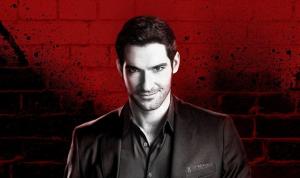My wife and I are catching up on the series Lucifer, once on network TV but now exclusively on Netflix. For those of you who watch the show, it wouldn’t surprise you to know that I go around the house asking the question, “What is it you desire?”
Desire. That’s an interesting word.
 The premise of the show is that Lucifer (Tom Ellis) is exhausted with administrating the affairs of Hell and decides to buck his father’s punishment and start a new life in L.A.
The premise of the show is that Lucifer (Tom Ellis) is exhausted with administrating the affairs of Hell and decides to buck his father’s punishment and start a new life in L.A.
He falls in love with a detective (Decker) and begins solving cases with her, all the while being completely transparent in his true identity. He confesses at least 10 times in the first two episodes, “I’m the devil.”
No one believes him. It is hilarious.
The theology of the show is incredibly interesting to me. Ellis’ Lucifer claims that Satan isn’t the cause of evil – he resents being blamed for everything, actually. Instead, most of the violence comes from the deepest desires of human beings. He is fully aware that his “dad” (God) is up to something – “messing with humanity” as he says – but that desire is the engine of the evil that people see in the world.
In turn, hell is simply an eternity of reliving the guilt and shame of actions born from selfish and destructive desires expressed here on earth. While this might not strike anyone as “orthodox” Christian theology, it makes for extremely interesting storylines.
What is it you desire?
The key moment in any episode is when Lucifer and Detective Decker are questioning a suspect, and Lucifer asks the question: “Tell me, what is it you desire?”
While the devil himself looks into their eyes, the suspect becomes helpless. They confess everything from wanting to kill someone to wanting to stop pretending they’re someone they’re not. More often than not, the statement of desire reveals what kind of person the suspect is at their core.
Desire, it seems, makes us who we are.
For years I’ve taught a model of spiritual transformation that involves head, heart, and hands. The premise is that if anything in our lives is going to change it requires new thinking (head), reordered will & drive (heart), and a shift in action (hands).
At the core of this model of transformation is the heart. The heart is the seat of will and drives. In other words:
The heart is the playground of desire.
What we want most is cultivated at the midpoint between our thoughts and our actions. We think about our relationships and we plant, water, and harvest desires planted deep within us. When our heart is set on something, when we want it with our wholeness, there is little to deter us.
Disappointment is therefore disappearing floor beneath our desires. It is a tragic, often traumatic fall when our desires are thwarted.
This is where anger comes from.
Jesus teaches so deeply into the human psyche when he says, If you deride and speak of your brother in a derogatory way, it won’t take much to then kill them. (Matthew 5:21-22, paraphrase)
When the heart stirs the stew of anger, desires unmet with other humans as the agents, the desire to kill becomes common. Murder becomes a preference akin to wanting ice cream in the summer.
In that sense, what we desire makes us who we are.
The heart captures a picture of the whole person. While our actions towards our spouse or neighbor display care and compassion, the desire behind that action shapes our character. Of course, it is possible to do good and holy things for the wrong reason.
A habit of living well based on misguided and selfish desires will, however, demolish our character.
So, if I might be so bold, may I ask as Lucifer would. What do you desire?
A helpful navigation tool to discovering our desire is one word: why?
When you got up this morning, what was the first thing you did? Why? After that, think about the first word you spoke to another person. Why that word or words?
As you listened to the podcast, news media, or read through your timeline, how did you respond? Why?
The “why” question is the curious exploration of the engines that drive our lives. Those same engines, those desires, also shape our character.
I believe that spiritual formation is the process by which God through the Holy Spirit and our participation helps us live fully in the wisdom of Jesus as his apprentices.
While that seems like a convoluted definition the heart (see what I did there?) of the whole thing is to address our desires.
Our desires form us.
The way we chase our desires forms us and others.
When we think about what we want, meditating and ruminating on it, we are cultivating not only what we want but who we will become?
So, again: what is it that you desire?
May we realize today that though the fictional devil has made a living asking this question, the very real Spirit of Jesus is interested in our answer as well.











